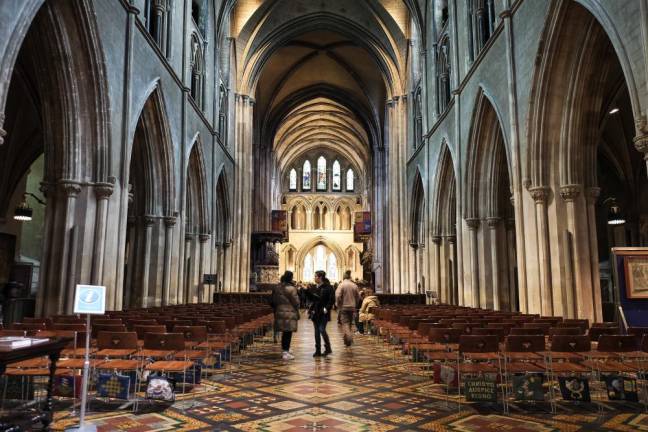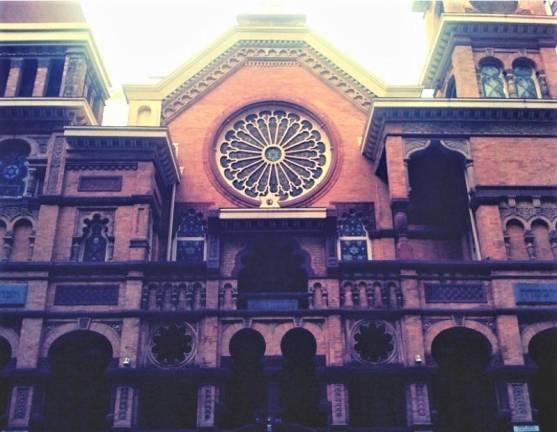Last Thursday, as Gov. Andrew Cuomo declared a state of emergency across New York, business carried on more or less as usual at the Islamic Cultural Center of New York at Third Avenue and 96th Street.
While attendance at many houses of worship has fallen off amid fears about community transmission of the coronavirus, the pandemic respiratory virus that can be fatal to seniors and individuals with pre-existing health issues, the faithful are still coming to pray, Sheikh Saad Jalloh, imam of the Islamic Cultural Center, told Straus News.
The center had canceled its Islamic Seminar, an annual conference that draws approximately 1,000 people, just days ahead of its scheduled start date, but regular worshippers trickled in and out of the masjid, pausing to leave their shoes at the door or slide them back on.
A few men with disabilities lingered near the center’s north gate seeking zakat, the practice of charity to the needy that is one of the Five Pillars of Islam.
In the main office, the center’s secretary administrator Latifa El bustled between her office and the reception area carrying a carton of pins emblazoned with the term “Airhugger,” a donation meant to remind students at the center’s weekend school to minimize physical contact to avoid spreading COVID-19, a highly contagious respiratory virus.
Effective Communication
A few blocks south at Park East Synagogue and School, day-to-day operations took a different tack, confronting the pandemic a slew of proactive health and safety measures.
“The school actually took preventative measures and we shut down the school for the last four days in order to allow us to do a deep clean and sanitization of the entire building,” Cantor Benny Rogosnitzky told Straus News.
Though no one in the Park East community had tested positive as of Thursday, the school was acting out of “an abundance of caution,” with mandatory hand-sanitizer at the entrance to the school. Parents are encouraged to self-report as much as possible.
“Parents are having trouble getting tested for corona...so even if there is a concern or suspicion, we’re asking them to let us know so that we’re able to get a sense of what’s actually happening with our parent body,” Rogosnitzky added. “Effective communication, from our perspective, is what keeps parents calm.”
The synagogue has pared down its services to a minimum, canceling all extraneous events, including its weekly Shabbat dinners for the time being, and is actively encouraging vulnerable community members to stay home.
A Delicate Balancing Act
“A synagogue, as a religious institution, is a place where people find calmness, and if anything, people are more fearful now and need more calming down and spirituality, so shutting the doors we think would set the wrong message,” Rogosnitzky said. “But at the same time, we want to be sensitive to what's happening, and the last thing we want to do is to be a breeding ground for more of this virus. So we're trying. It's really a very, very delicate balancing act between the two.”
On Saturday, the Archdiocese of New York announced that all services — except the closed mass broadcast from St Patrick’s Cathedral — were canceled in the 10 counties it covers, though churches remain open for ”private prayer.” The St. Patrick’s mass can be viewed on the church’s website or by tuning in to the Catholic Faith Network on TV. It can also be heard on Sirius XM radio.
On the Upper West Side, Congregation Rodeph Sholom synagogue took the 21st century solution one step further, announcing in an email that all services would be live streamed only, starting with Friday’s Shabbat service.
“When we are unable to seek comfort in the physical presence of our congregation, we can elevate and nurture our spiritual and emotional sense of connectedness,” the clergy team wrote, emphasizing that though the doors would not open for services, they remain available to their members.
'God Will Understand'
The sacrament of communion, a practice that involves drinking from a communal cup and consuming bread placed in the receiver’s hand or mouth by the priest, has presented a particular challenge to Christian congregations since COVID-19 first appeared in the city earlier this month.
“Those who do attend Mass are reminded that they should follow the guidelines in place, such as receiving Holy Communion reverently in the hand, not receiving the Precious Blood...and avoiding physical contact with or close proximity to other persons,” the press release advised.
In the church’s weekly newsletter, Father Stephen Gerth, rector of the Church of St. Mary the Virgin, asked his Episcopalian congregation to maintain their distance during the part of the service that calls for greeting neighbors. “It’s an old custom,” he wrote. “Still, if we refrain from shaking hands or embracing—and that is what I would like us to do—until we have a better grip on this virus, God will understand.”
"The last thing we want to do is to be a breeding ground for more of this virus." Cantor Benny Rogosnitzky of the Park East Synagogue

